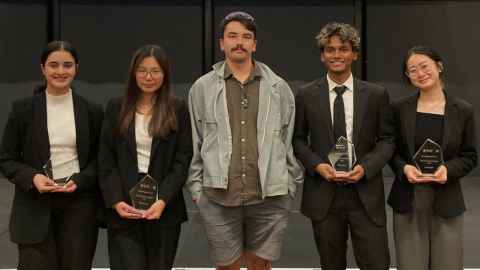Serial entrepreneurship a big ambition for student
16 June 2024
The Business School’s Case Programme is inspiring Sharjil Kazi and other students to dream big.

Sharjil Kazi has had his sights set on entrepreneurship since he was a teenager. “On our walks home from high school, a friend and I would always discuss building a tech start-up. We fed off each other’s energy,” he recalls.
He enrolled in a conjoint Bachelor of Engineering (Honours) and Bachelor of Science degree in 2021 at the University of Auckland, specialising in software engineering and applied mathematics, respectively. While studying, he developed a business mindset by surrounding himself with business students and professionals. When the opportunity to join The Case Programme arose, he didn’t hesitate.
Sharjil has taken part in four case competitions, the most recent of which was the 2024 Monash Business School Case Day. Here, he and fellow students Sophia Kwong, Aneta Du and Aliza Biviji competed against seven teams from across Australasia. They put their business knowledge to the test with a challenge that asked contestants to provide innovative recommendations for an Australian buy now, pay later provider.
To prepare for the event, the team – who chose the Star Wars-themed name Darth Value – underwent five weeks of intensive training. “We would crack a case or two every Sunday and present it to the coaches, then have meetings throughout the week strategising how we could work better as a team and what frameworks we would use in the case room,” he says. This kind of planning ensured they could adapt to address unexpected developments at the event – which is a normal occurrence with case days, he notes. “There is always something that goes wrong. It can be intense, as with any competition, but that’s what makes it so fun!”
Teams had five hours to develop their concept, then ten minutes to present their case to the judging panel before a final Q&A session. Darth Value impressed judges enough to take the winning spot, with another team from the University, comprised of Aditya Singh, Christiana Ballard, Jia Gu and Jason Peng, coming in second place.
The Monash case day is one of several annual events open to participants of The Case Programme, which is run by the Business School and made possible thanks to philanthropic support. Recent events were supported by University alumni Jonathan Mason, Raymond Webb and Nathan George, as well as the programme’s founder, Brendon Potter.
“The Case Programme aims to deliver a transformational team-based development experience to promising students across all faculties,” explains Case Programme Manager Cameron Haworth. “It is one of the most engrossing leadership opportunities offered to students. We use international competitions to benchmark our performances against the best in the world.”
The University has been winning big with other recent case successes. In May of this year, Joshua Taefu, Manya Bhasin, Eric Zhu and Abby Sathyendran won the New Zealand National League, hosted in Wellington. Also in May, Trinayan Krishnan, Hannah Jones, Joshua Paul and Issie Dekker came in first place in a field of 20 teams at the Chulalongkorn International Business Case Competition in Thailand. More recently, Luke Davis, Helen Lam, Freddy Jensen and Rohit Guthpe topped their division at the HSBC-HKU Asia Pacific Business Case Competition in Hong Kong.
Winning in Thailand was “unreal”, says Trinayan, adding that the entire experience has been valuable. “Joining The Case Programme was the best decision I made during my time at the University of Auckland. The networking opportunities it provides domestically and internationally and the business acumen you generate are unrivalled by anything else. Alongside that, the people make this club special. Friends are made for a lifetime.”
For Sharjil, being part of the programme has likewise been an influential experience. “The competitions show that if your process is good, results will follow. If you truly want to create a great product, the team behind it must be masters at working with each other.” He says that the programme has helped develop his skill set, citing improved critical thinking, problem-solving and people skills.
Importantly, his involvement solidified his ambition to become what he calls “a serial entrepreneur”, or someone with multiple ventures under their belt. “A whole new world was unlocked. Meeting start-up founders at different stages of their journey really inspired me to continue down the road of a founder.” His long-term goal is to find solutions to significant global issues, such as improving education in Third World countries. “I believe one can only be successful if they give more value to the world than they receive. I hope to become a leader that will go on to solve real problems the world is struggling with.”
The programme also introduced Sharjil to fellow student Omar Mourad, with whom he is now building a company. After extensive brainstorming and market research, they began working on a product that streamlines and optimises online newsletters to improve the user experience. “We noticed people who subscribe to multiple newsletters end up unsubscribing or not reading them due to clutter. People who are time-poor also end up missing content they would have liked.”
The product, called Lucy, will provide features such as audio conversion, summarisation and recommendations to help people get the most from their inbox. They are currently in the process of building the minimum viable product with team members Kiko and Olivia Ilievska, and are excited for what is to come.
Media contact
Helen Borne | Communications and Marketing Manager
Alumni Relations and Development
Email: h.borne@auckland.ac.nz